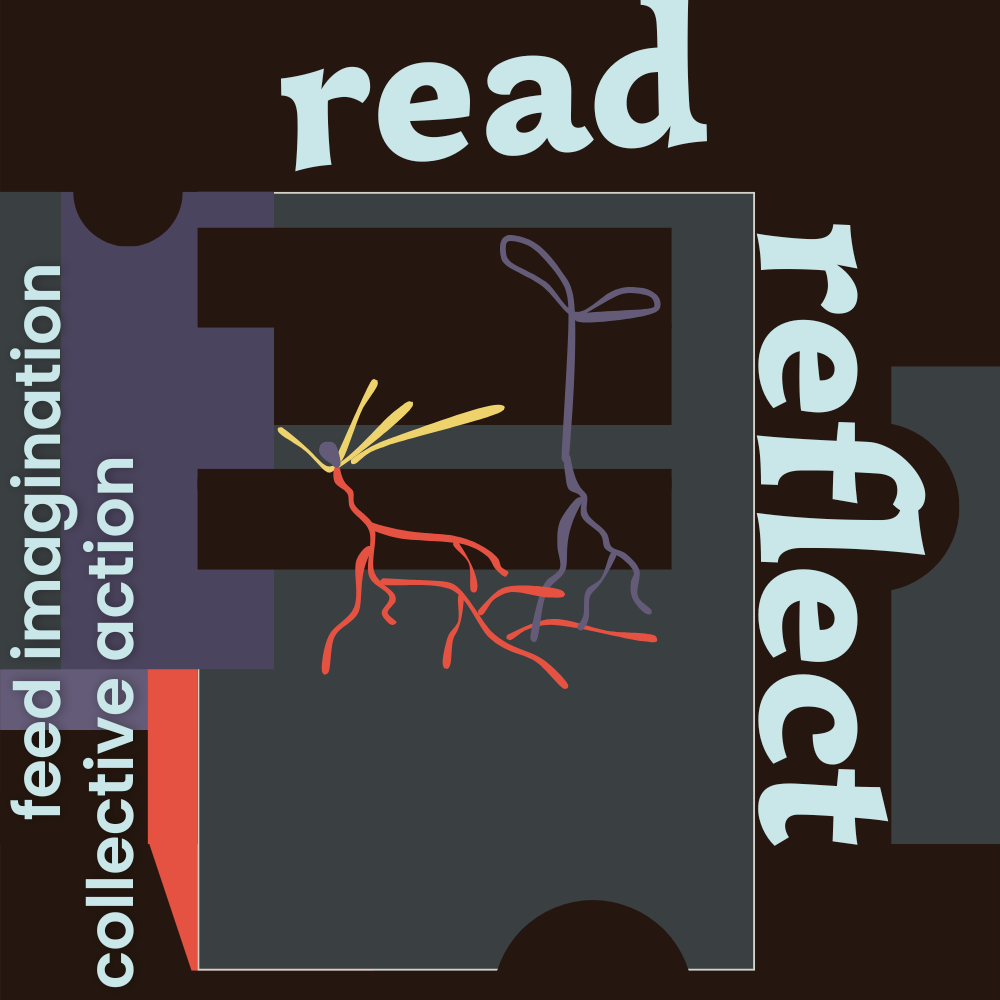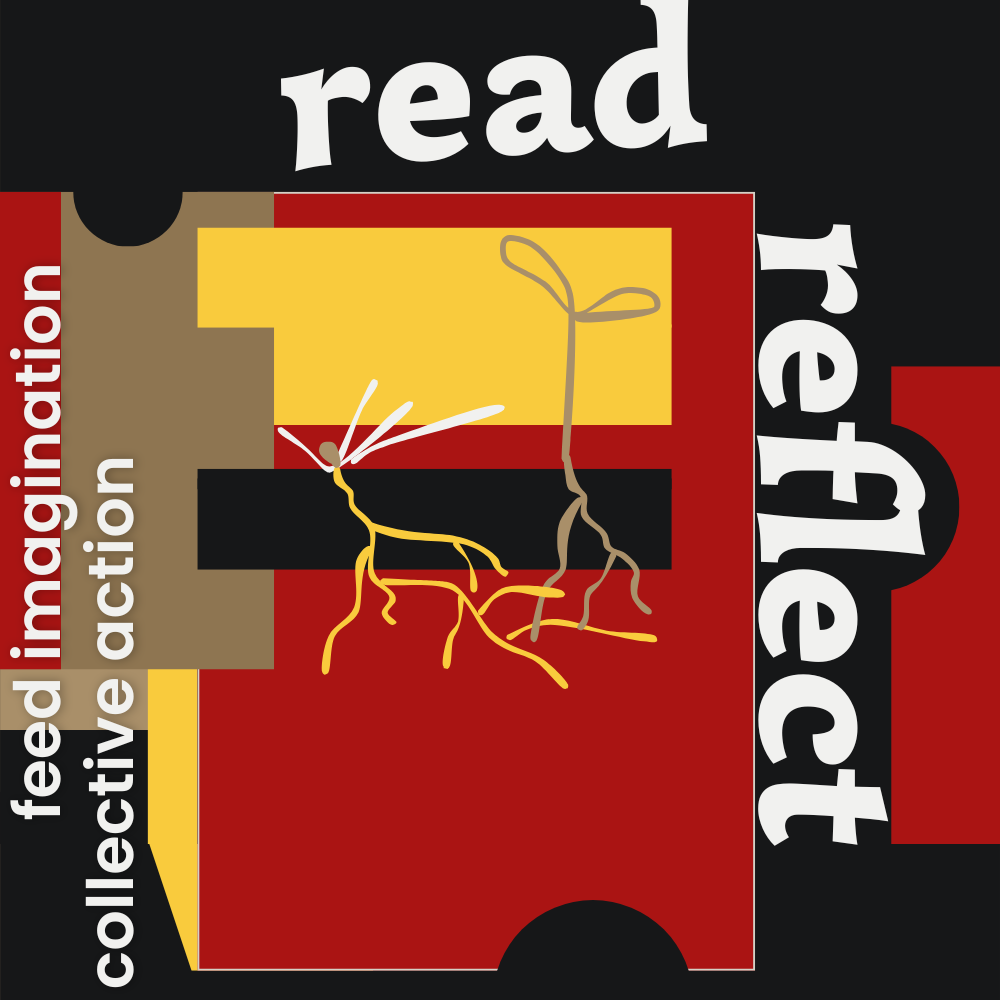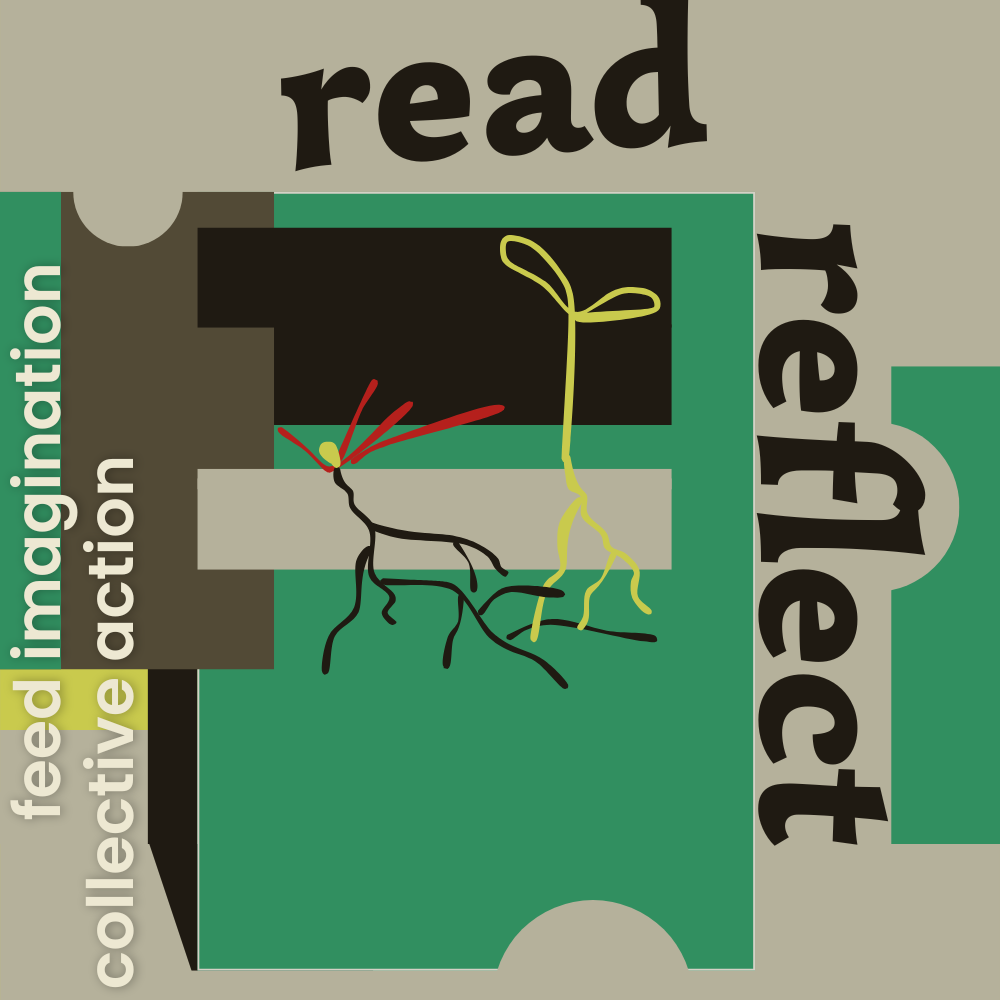2025: Book written by an author from/written about Puerto Rico
Book recommendations/suggestions for the Read, Seed, Water, Feed 2025 book challenge. Find your next book!
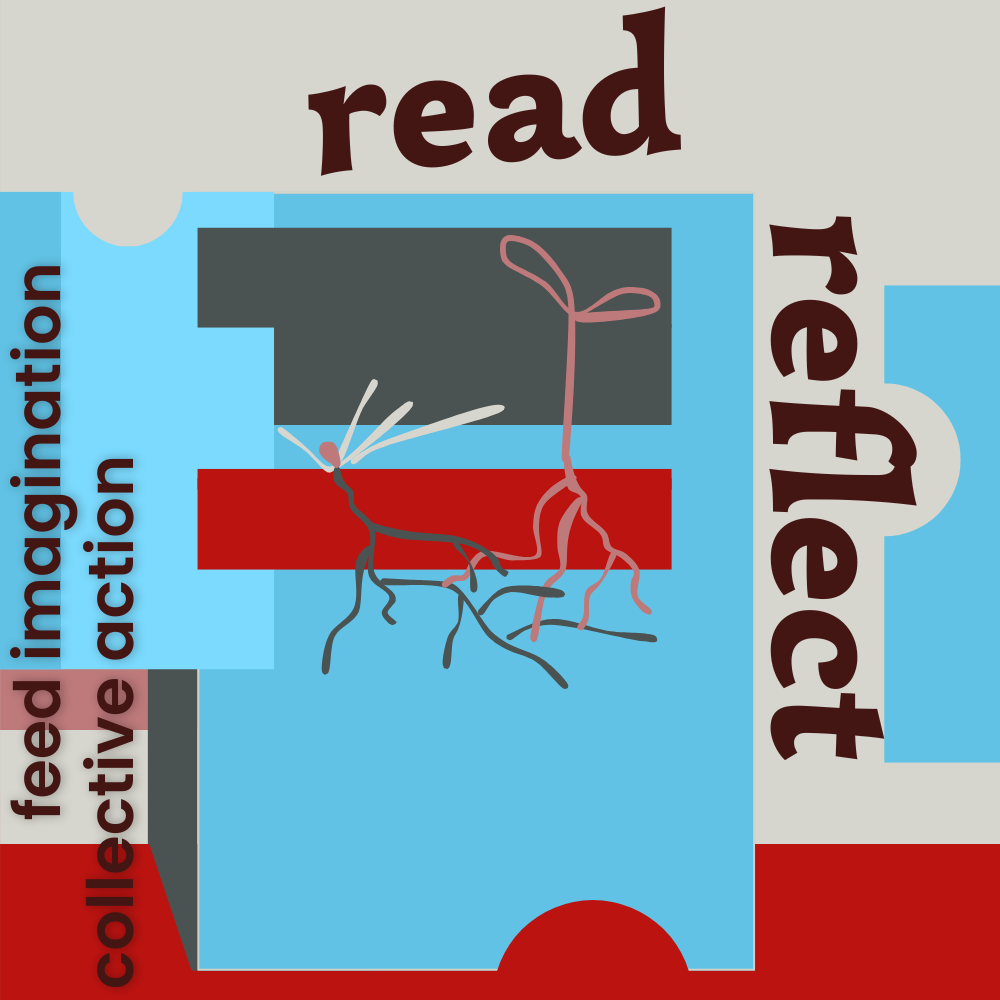
read, seed, water, feed book challenge - about prompt support posts
about prompt support posts
All of the prompt support posts (those that begin with "2025: Book written by...", for example) are organized similar to each other.
Each of these posts was created to support the Read, Seed, Water Feed book challenge on Storygraph that I am hosting. They were also created to support learning outside of the university, collective educational efforts, finding new authors to read, finding books, and more.
For each book challenge prompt, I will share the following sections:
- one or more slides with books I have read or am currently reading that I recommend for the prompt
- a list of additional books from my TBR (to-be-read) list for the prompt
- a text listing of the books that I shared in the slides
I might share one or more of the following in addition, depending on capacity and other factors:
- other supportive text as appropriate, such as countries included
- some quotes, notes, and/or reflections about one or more of the books
- links to other posts on the site where I discuss the books or prompt in more detail
I did many things to minimize hierarchy within these posts, and there will still be some things that might feel odd, such as split galleries of slides, which was a choice made to address current limitations in how the galleries work.
If interested, find bingo cards, more background on the prompts, and other reflections, on the Reading Challenge page and if on Storygraph, join the challenge.
Mostly, my goal for prompt support posts is to share books for each prompt, as suggestions and as examples. This section will be first on every post and may be skipped.
Thank you for reading.
Recommended Books
Books I've read or am currently reading that I recommend for this prompt.
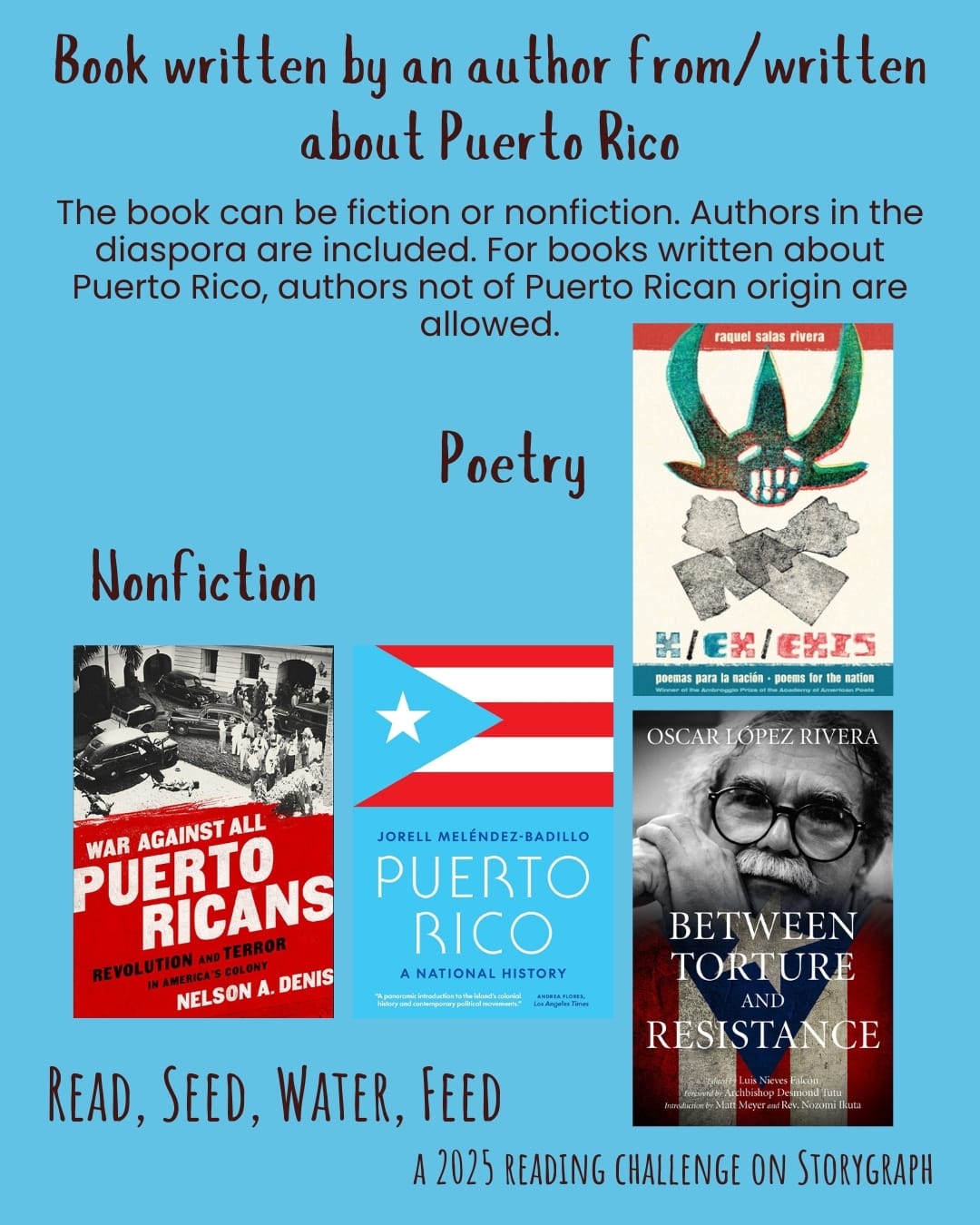
More Books from my TBR List
For some prompts, I’m trying to diversify what I read; for others, deepening my knowledge while also growing my perspective. For some prompts, there are definitely more books on my to-be-read (TBR) list than the ones I share that I have read or am currently reading. Here are some of those books:
Nonfiction
- Aftershocks of Disaster: Puerto Rico Before and After the Storm (2019) by Yarimar Bonilla and Marisol LeBrón
- Decolonizing Diasporas: Radical Mappings of Afro-Atlantic Literature (2020) by Yomaira C. Figueroa-Vásquez
- Non-Sovereign Futures: French Caribbean Politics in the Wake of Disenchantment (2015) by Yarimar Bonilla
- Policing Life and Death: Race, Violence, and Resistance in Puerto Rico (2019) by Marisol Lebrón
Fiction
- Olga Dies Dreaming (2022) by Xochitl Gonzalez
Poetry
- Antes Que Isla Es Volcán / Before Island Is Volcano (2022) by Raquel Salas Rivera
- Puerto Rico en mi corazón (2019) by Erica Mena, Carina Del Valle Schorske, Raquel Salas Rivera, and Ricardo Alberto Maldonado
Notes: Decolonization and Resistance
All highlights are my own.
From War Against All Puerto Ricans
When I read War Against All Puerto Ricans: Revolution and Terror in America's Colony, it felt like it wrapped around my heart, connected me with people who were part of Puerto Rico’s history of resistance against the US empire, and made me want to support with all my heart their independence efforts.
Nelson A. Denis writes,
Not having been incorporated into the community of sovereign nations of the globe, Puerto Rico must always have her international relations sifted through the U.S. State Department.
That this is an arrangement suitable to U.S. interests is demonstrated by its determined refusal to permit the Committee on Decolonization of the United Nations to include Puerto Rico on the list of territories which “have still not obtained their independence” under the provisions of Resolution 1514 (XV), passed by the General Assembly of the United Nations in December 1960.
This might not seem important to a person who believes that the United States has Puerto Rico's interests at heart, or those of its property-holding class, or those of anyone with material interests that are improved by being part of the United States, and not independent of it. However, to understand any part of Puerto Rico's modern history is to understand how the United States took possession of Puerto Rico. [1]
From x/ex/exis
I was reading raquel salas rivera's x/ex/exis when I came to a poem dedicated to Oscar López Rivera, and it reminded me that I had wanted to read his memoir. The poem is "when you tie rope and ribbon." It is available to read on the Academy of American Poets website: https://poets.org/poem/when-you-tie-rope-and-ribbon.
I've shared separately about myself, that I am still looking for a name. I share a few lines from raquel salas rivera's poem "they":
what do we eat when a name dies?
[...]
what is that about, going out
and not having to explain
you aren’t that her
or that thing? [2]
The poem continues, ends, and this too below is part of my/our fight.
in this, our language [3],
there exists no plural that doesn’t deny me.
From Between Torture and Resistance
I recently started Between Torture and Resistance, and am sharing a few sections of the introduction that I appreciated. The ideas are not new to me, in really any way, but I still lack the words and language to express them as I want to be able to. For that, I try to amplify the words of those who have already expressed the ideas, and so I try to do that here. Again, highlights are my own, what I have tried to do here to be concise.
Dr. Luis Nieves Falcón, the editor of Oscar López Rivera's Between Torture and Resistance, wrote in the Introduction in 2013,
In the United States, individual liberties are increasingly being restricted and encroached by the State apparatus, which strives to achieve absolute control of public opinion and annihilate all dissent, while itself generally acting outside the law. Consequently, the State has become the principal threat to individual freedom, the free spirit, and creativity.
[..]
Along with violations of law, the United States has also developed a psychological and emotionally charged campaign to impose upon the population the internalization of a highly negative view of those who are dissidents. This is, in effect, an effort of the State to demonize those who are different, while isolating dissidents from the population at large. In turn, such a campaign seeks to gather support for the illegal conduct of the agencies of the State. The nomenclature used to create these negative categories has changed over time but always retains its high emotional charge. [4]
He continues,
The rise in violations of civil and human rights by the State results in different levels of resistance against specific domestic and foreign policies, which in turn leads to a public policy of cruel and vengeful repression. The ultimate goal is to eliminate dissent by all means that are available to the repressive apparatus of the State.
In the conflict arising from the illegal conduct of the State—which includes, but is not limited to crimes against peace and against humanity as well as war crimes—and the resistance by an opposition that combats the illegal actions of the State, the judicial system is revealed as an important partner in the official strategy of repression.
[..]
Judicial discourse has a common ideological content: the obstinate refusal to accept that in the United States there are people who are persecuted and imprisoned for holding ethical and political positions that are in opposition to those sustained by the U.S. government; the furious denial of the existence of political prisoners in U.S. jails and prisons; the assertion that the only avenues open to dissidents are the electoral process and official channels of expression; the denial that revolutionary actions are a legitimate avenue of change; the use of linguistic categories of a deprecatory nature to classify dissidents and thereby justify disproportionate sentences, which allow for the permanent removal from society of dissidents and political militants, while at the same time allowing criminal violators of international law to walk about freely and with impunity.
[..]
The other profile, that of the resisters and militants who have been imprisoned for their objections of conscience, is a profile of a group of people who are deeply committed to fighting against racism and social injustice and growing militarization and nuclearization. They fight against: U.S. collaboration with racist regimes; military interventions in sovereign states; the continuing aid the United States gives to dictatorial regimes; U.S. participation in terrible atrocities against peoples who are engaged in liberation struggles; and the continued imposition of a colonial regime in Puerto Rico. All of these official actions involve violations of international law, the compliance of which are compulsory for U.S. citizens as established in the Nuremberg principles. [5]
Related to Puerto Rico: A National History
Earlier this year, Priya Nelson, Senior Editor of History at Princeton University Press, English publisher of Puerto Rico: A National History, wrote an essay about Bad Bunny's recent album release.
Reading it, I'm thinking about how a decision can increase awareness, increase hope, about explosions of ideas within consciousness though more Paolo Freire's conscientization/conscientização where the decisions and actions lead to more community consciousness, awareness, planting seeds, while also music like water, sound like food, feeding action, feeding hope, the ways that art is not neutral, and also how art and music meld and draw from history and create history, the past, the present, and the future. In gratitude..
Priya Nelson wrote,
... Bad Bunny made an unprecedented decision to use his power to refuse the demands of our mediatic age. Instead of releasing flashy, highly produced videos for each track, the artist’s team worked with Jorell Meléndez-Badillo, author of Puerto Rico: A National History, to create historical slides that were launched alongside each of the seventeen tracks... Dense layers of meaning bely the simplicity of the slides. The background is the light blue of the original Puerto Rican flag, before the US imposed the current dark blue to match its own. And the texts themselves speak with the music, creating innumerable possibilities for historical insight.
Read more:

On this day, now yesterday..
I want to write about the Ponce Massacre, 88 years ago today, now yesterday, March 21, 1937, and cannot find my way to being brief. I will try to write about it and other things separately.
Recommended Books in a List
As a list, books I've read or am currently reading that I recommend for this prompt:
Nonfiction
Between Torture and Resistance (2012) by Oscar López Rivera
Puerto Rico: A National History (2024) by Jorell Meléndez-Badillo
War Against All Puerto Ricans: Revolution and Terror in America's Colony (2015) by Nelson A. Denis
Poetry
x/ex/exis: poemas para la nación/poems for the nation (2021), a book by raquel salas rivera, bilingual edition (Spanish and English)
Get any/all of these books wherever you get your books.
Please support libraries however you can. Find out many ways to get involved in supporting libraries at Libraries for the People.
Please consider purchasing books when they are available from Workshops 4 Gaza's bookstore: Aftershocks of Disaster (2019) by Yarimar Bonilla and Marisol LeBrón. When I share books that are available for purchase there at the time of posting, I will list them here after the link.
Thank you for reading.
notes
Nelson Denis, War Against All Puerto Ricans: Revolution and Terror in America's Colony (2015), 314, Kindle Edition.↩︎
raquel salas rivera, x/ex/exis: poemas para la nación/poems for the nation (2021), "they".↩︎
- Ibid., footnote reference in original: "our language is spanish. ours, but never quite mine." ↩︎
Oscar Lopez Rivera, Between Torture and Resistance (2012), Introduction.↩︎
- Ibid.↩︎

